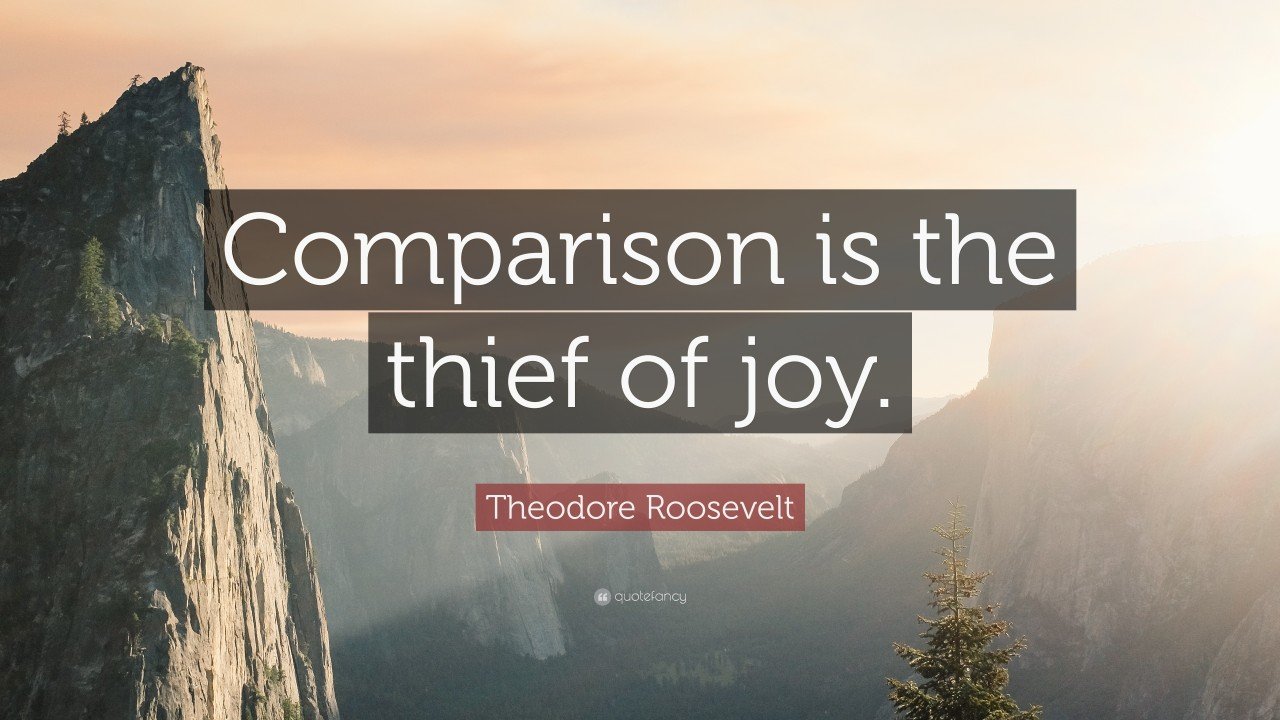Comparison is the Thief of Joy
In a world filled with social media, advertisements, and constant messages about what we should have, do, and be, it’s easy to forget one crucial lesson: comparison is the thief of joy. This phrase, often attributed to Theodore Roosevelt, highlights a profound truth in our lives. When we compare ourselves to others, we usually diminish our happiness and satisfaction. In this article, we’ll explore the depths of this concept, its implications on our mental well-being, and how we can cultivate a life rich in joy.
Understanding the Concept of Comparison
The Nature of Comparison
Comparison is a natural human behavior. We often measure our success, achievements, and even happiness against those of others. While this can sometimes motivate us to improve, it can also lead to feelings of inadequacy. Here are a few common scenarios where comparison tends to rear its ugly head:
- Social Media: Platforms like Instagram and Facebook often showcase the highlight reels of people’s lives. Seeing friends and influencers with seemingly perfect lives can make us feel inadequate.
- Work Environment: Comparing ourselves to colleagues in the workplace can breed unhealthy competition and stress, especially if we ddon’tachieve as much as others.
- Personal Relationships: Observing ffriends’relationships or family dynamics can sometimes lead us to question our own.
The Psychological Effects of Comparison
When we constantly measure ourselves against others, it can have significant psychological effects, including:
- Low Self-Esteem: Constant comparison can lead to feelings of inferiority, as we might perceive ourselves as less capable or successful.
- Anxiety and Depression: These feelings of inadequacy can spiral into more serious mental health issues, such as anxiety and depression.
- Loss of Motivation: Instead of inspiring us, comparison can sap our motivation. We might stop trying altogether when we cannot measure up.
The Thief of Joy: How Comparison Affects Our Happiness
Happiness and Contentment
Happiness is often tied to our sense of contentment. When we compare ourselves to others, we shift our focus from what we have to what we lack. HHere’show, comparison directly impacts our joy:
- Shifting Focus: Instead of appreciating our achievements and progress, we become fixated on others, leading to dissatisfaction.
- Unrealistic Expectations: Social media often paints a distorted picture of reality. We see curated images that ddon’treflect the whole story, leading us to set unrealistic standards for ourselves.
The Social Media Trap
Social media is a significant contributor to the phenomenon of comparison. Platforms are designed to showcase the best moments of our lives, often creating an illusion of perfection.
- Highlight Reels vs. Reality: Most people only post their achievements, travels, and happy moments, leading us to believe everyone else lives a flawless life.
- Fear of Missing Out (FOMO): Seeing friends engaging in fun activities can trigger feelings of loneliness and exclusion, making us question our social lives.
The Impact on Relationships
Comparison can also create rifts in our relationships. When we measure our friendships or romantic relationships against others, it can lead to:
- Jealousy and Resentment: Envy can emerge when we feel our relationships aaren’tas fulfilling as those we see online.
- Inability to Appreciate: Focusing on what others have can prevent us from recognizing the beauty and value in our relationships.
Breaking Free from the Cycle of Comparison
Awareness and Mindfulness
The first step in overcoming the effects of comparison is becoming aware of our thoughts and feelings. Practicing mindfulness can help:
- Recognizing Triggers: Identify situations or platforms that trigger your comparison thoughts.
- Being Present: Mindfulness encourages us to focus on the present moment, appreciating our experiences rather than comparing them to others.
Cultivating Gratitude
One powerful antidote to comparison is gratitude. By focusing on what we have, we can shift our mindset:
- Gratitude Journals: Keeping a daily journal listing things yyou’rethankful for can help you appreciate your life.
- Celebrating Small Wins: Acknowledge and celebrate your achievements, no matter how small they may seem.
Limiting Social Media Exposure
Reducing the time spent on social media can significantly decrease feelings of inadequacy. Here are some tips:
- Curate Your Feed: Follow accounts that inspire and uplift you rather than those that trigger comparison.
- Set Time Limits: Allocate specific times for social media use, reducing mindless scrolling.
The Role of Self-Compassion
Understanding Self-Compassion
Self-compassion involves treating ourselves with the kindness and understanding we would offer a friend. HHere’show, it can combat comparison:
- Recognizing Common Humanity: Understanding that everyone struggles and faces challenges can help us feel less isolated in our experiences.
- Being Kind to Ourselves: Instead of criticizing ourselves for not measuring up, we should embrace our imperfections and acknowledge our unique journeys.
Practical Self-Compassion Techniques
- Affirmations: Use positive affirmations to reinforce your self-worth and value.
- Mindful Breathing: Practicing mindful breathing can help centre you and promote a sense of calm.
Finding Joy in Your Journey
Embracing Individuality
Recognizing and embracing your unique path is essential. HHere’show,, you can focus on your journey rather than comparing it to others:
- Set Personal Goals: Define what success means to you personally rather than adopting societal standards.
- Focus on Your Passions: Invest time in activities and hobbies that bring you joy rather than what others think you should pursue.
Building a Supportive Network
Surrounding yourself with supportive individuals can bolster your sense of self-worth and joy:
- Seek Positive Relationships: Engage with friends and family who uplift and encourage you.
- Share Your Feelings: Openly discussing feelings of comparison with trusted friends can provide relief and understanding.
A Table of Strategies to Combat Comparison
StrategyDescriptionBenefits
Mindfulness: Practice being present and aware of thoughts, Reduce anxiety, and increase happiness.
Gratitude Journals: Write down things you’re thankful for. Shifts focus from lack to abundance.
Limit Social Media. Cut down on time spent on social platforms. Decrease triggers for comparison.
Self-Compassion: Treat yourself with kindness. It improves self-esteem and emotional resilience.
Set Personal Goals Define success based on your values. Encourage personal growth and fulfilment.
Conclusion: Embracing Joy
In summary, comparison is the thief of joy. By understanding how comparison affects our happiness and adopting strategies to combat it, we can create a life filled with joy and contentment. RRememitit’s perfectly fine to aspire to be better, but never let the achievements of others overshadow your unique journey. Embrace your individuality, celebrate your successes, and cherish the joy of living authentically.











Post Comment